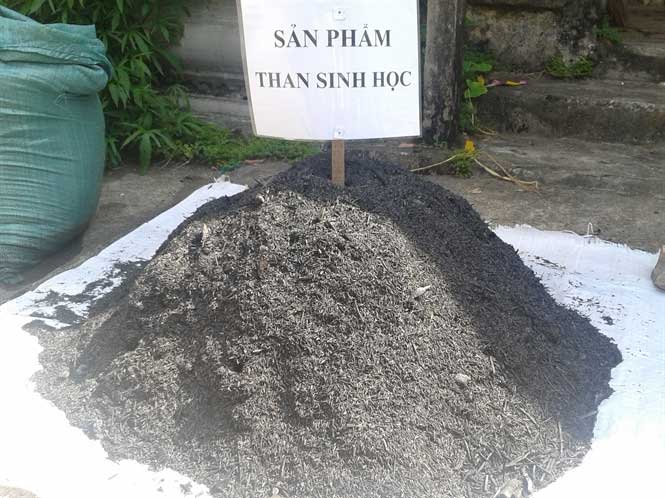Biochar from Rice Husks has been found to be more effective in improving saline-alkaline soils compared to products made from other agricultural by-products, according to research conducted by scientists at Ho Chi Minh City University of Industry.
Untapped Potential
Biochar has been extensively studied for its ability to reduce the concentration of heavy metals in water and soil. Utilizing biochar enhances the organic carbon content in the soil, reduces greenhouse gas emissions, and improves soil properties, thereby increasing crop yields.
Biochar can also enhance soil fertility and crop productivity by reducing soil acidity, improving nutrient retention, enhancing soil structure, and increasing the levels of nutrients such as nitrogen (N), phosphorus (P), and potassium (K). Reports indicate that biochar can mitigate the adverse effects of saline soils, promoting better growth and yield of crops.
In Vietnam, there is a plentiful supply of agricultural by-products available for biochar production. However, these by-products are often discarded or burned after harvest, leading to environmental pollution and wastage of renewable resources.

Biochar can enhance soil fertility and crop productivity. (Illustrative image).
Therefore, recovering and converting various agricultural by-products into biochar and returning it to the soil—particularly in problematic areas such as saline-alkaline soils—is a creative approach that holds significant environmental, economic, and social benefits. However, research on biochar aimed at improving saline-alkaline soils remains limited in the country.
In response to this reality, a research team at Ho Chi Minh City University of Industry has undertaken a project titled “Research on the Mechanism and Potential of Improving Saline Agricultural Soils with Biochar Produced from Agricultural By-products.”
Associate Professor Dr. Nguyen Thanh Binh, the project leader, stated that four types of biochar were produced by the team from rice husks, corn stalks, longan branches, and coconut coir, using a manual pyrolysis method in an anaerobic environment.
These four types of biochar were used to assess their sodium (Na) adsorption capacity. Most of the biochars exhibited high alkalinity (pH 7.2 – 9.4), while saline-alkaline soils were found to be highly acidic (pH 3.8).
Results indicated that rice husk biochar is a potential adsorbent due to its large surface area, high porosity (60.5%), and sodium adsorption capacity reaching 33.9 (mg/g of biochar), followed by longan and corn biochar.
Coconut coir biochar had the smallest surface area and the lowest sodium adsorption capacity, at 15.5 (mg/g of biochar). Biochar adsorbs sodium while releasing other cations such as potassium (K), calcium (Ca), and magnesium (Mg). Coconut coir contains high levels of sodium and chloride, making it the least effective for improving saline-alkaline soils.
Altering Soil Properties
According to the research team, the addition of various types of biochar to saline-alkaline soils has positively altered soil properties favorable for plants, such as reducing soil acidity (increasing pH), decreasing the levels of toxic elements like aluminum (Al) and iron (Fe), and increasing the levels of soil nutrients such as K, Ca, and P.
Thus, all types of biochar have the potential to improve soil quality to varying degrees, depending on the proportion of biochar used and the soil characteristics. The biochars improved soil quality by 33 – 46%.
Due to the lower potential of coconut coir for improving saline-alkaline soils, the team opted to use only three types of biochar from rice husks, corn stalks, and longan branches to mix with saline-alkaline soil (sourced from rice-shrimp rotation fields in Can Gio District, Ho Chi Minh City) at ratios of 0.7% and 1.5% for paddy rice cultivation.
Test results showed that rice husk biochar was more effective than longan and corn biochar in improving soil quality, increasing yields by 5 – 6% per hectare per crop (an increase of 0.46 kg/m2 per crop when using longan biochar and 0.47 kg/m2 per crop when using rice husk biochar) compared to no biochar application.
Therefore, the authors recommend prioritizing the use of rice husk biochar in saline-alkaline soils. In addition to its effectiveness in soil improvement, rice husk biochar is also cheaper to produce than the other types. The recommended application rate is 8 – 10 tons per hectare per crop.
Biochar has a lasting efficacy of up to four cropping cycles, allowing it to be applied in the first crop and omitted in the following three crops while still ensuring rice production effectiveness. The team also advises against using biochar from coconut coir, corn stalks, and any vegetation from coastal saline areas, as these may accumulate high levels of various salts.
Currently, the research team has completed the process for using biochar on saline-alkaline soils, which can be scaled up for widespread application to disseminate the research findings.


















































